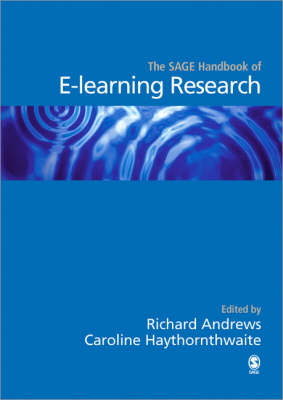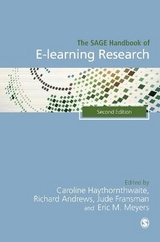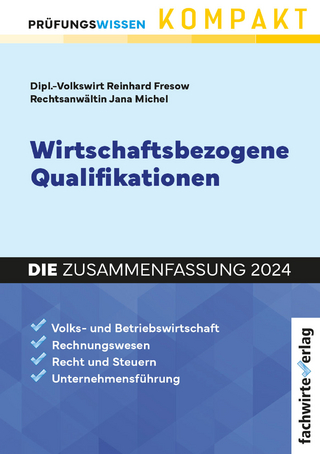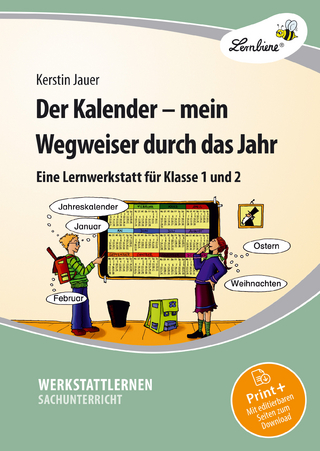
The SAGE Handbook of E-learning Research
SAGE Publications Inc (Verlag)
978-1-4129-1938-8 (ISBN)
- Titel erscheint in neuer Auflage
- Artikel merken
This handbook provides a state-of-the-art, in-depth account of research in the rapidly expanding field of e-learning.
′I would like to enthusiastically recommend The SAGE Handbook of E-Learning Research. An international set of authors have produced a highly readable handbook that covers topics in E-learning research, theory, policy, language and literacy, and design issues. The work draws on multiple perspectives ranging from early work in asynchronous learning networks to community organization in e-learning. This is a large and much needed work that organizes and illuminates issues in E-learning in a way that readers will be able to take away practical advice for their own use. I am quite pleased to see this handbook that provides a very useful organization of knowledge for our field′ - John Bourne, Ph.D Professor and Executive Director, The Sloan Consortium (www.sloan-c.org)
′This book is an important contribution to the development of E-learning because its account of the research always begins with the context of learning from which the exploitation of technology can be viewed. The authors help us understand that technology affords new kinds of relationship between the learner and what is learned, and how it is learned. With this rich understanding, the book is able to build the wide-ranging research foundation on which the field can move forward′ - Diana Laurillard, Institute of Education, University of London
′A comprehensive and compelling resource that provides a global perspective on a development that is transforming higher education′ - David Pilsbury, Chief Executive, Worldwide Universities Network
′Unlike many how-to books on the topic...this work focuses on research for educators and others interested in how technology enhances or diminishes learning. Highly Recommended′ - Choice Magazine
This handbook provides a state-of-the-art, in-depth account of research in the rapidly expanding field of E-learning. The first of its kind, it provides reviews of over 20 areas in E-learning research by experts in the field, and provides a critical account of the best work to date. The contributors cover the basics of the discipline, as well as new theoretical perspectives. Areas of research covered by the Handbook include:
-Contexts for researching e-learning
-Theory and policy
-Language and literacy
-Design issues
-History of the field
The editors′ introduction and many of the chapters show how multiple aspects of E-learning interact. The introduction also provides a new model for researching the field.
This book is relevant for everyone in higher education, from undergraduate to faculty, as well as university administrators involved in providing E-learning. It will provide a research background for higher education, including universities, training colleges, and community colleges. It will also be relevant to those involved in any research and developmental aspect of E-learning - corporate trainers and those involved in online programs at secondary school or in virtual high schools.
Whether you are a lecturer, researcher or programme designer, this is an essential read.
Richard Andrews is Professor in English at the Institute of Education, University of London and Visiting Professor at New York University′s Steinhardt School of Education, Culture and Human Development.
Caroline Haythornthwaite is Associate Professor at the Graduate School of Library and Information Science at the University of Illinois at Urbana-Champaign.
I focus on research in the fields of language education, argumentation, writing development, multimodality, rhetoric and e-learning. With colleagues I designed the MA in English Education. Areas of Research Computer-mediated communication (CMC) and the Internet; information exchange via CMC; online communities; e-learning; social network analysis; collaboration; social informatics; community informatics
Introduction to E-learning Research - Richard Andrews and Caroline Haythornthwaite
PART ONE: CONTEXTS FOR RESEARCHING E-LEARNING
Development and Philosophy of the Field of Asynchronous Learning Networks - Starr Roxanne Hiltz, Murray Turoff and Linda Harasim
On Computers and Writing - Gail E Hawisher and Cynthia L Selfe
Digital Divide and E-learning - Caroline Haythornthwaite
Learning and Lessons from the World of Games and Play - Angela McFarlane
Learning Sciences Theories and Methods for E-learning Researchers - Christopher Hoadley
PART TWO: THEORY
From Distance Education to E-learning - Melody M Thompson
E-learning and the Reshaping of Rhetorical Space - Terry Locke
Researching the Cognitive Cultures of E-learning - Andrew Whitworth
A Theory of Learning for the Mobile Age - Mike Sharples, Josie Taylor and Giasemi Vavoula
Computer Supported Collaborative Learning - Naomi Miyake
PART THREE: POLICY
Policy and E-learning - Virgil E Varvel, Rae-Ann Montague and Leigh S Estabrook
An International Comparison of the Realtionship between Policy and Practice in E-learning - Grainne Conole
Community-embedded Learning - Michelle M Kazmer
The Challenges of Gender, Age and Personality in E-learning - Konrad Morgan and Madeleine Morgan
PART FOUR: LANGUAGE AND LITERACY
Bilingualism and E-learning - Janina Brutt-Griffler
Second Language Learning and Online Communication - Carol A Chapelle
Literacy, Learning and Technology Studies - Ilana Snyder
Problems in Researching E-learning: the Case of Computer Assisted Language Learning - Zhao Yuan
PART FIVE: DESIGN ISSUES
New Conceptions for Community Design - Bronwyn Stuckey and Sasha Barab
Researching the Impact of Online Professional Development for Teachers - Wynne Harlen and Susan J Doubler
Exploring E-learning Community in a Global Postgraduate Programme - Ellen Roberts and Jane Lund
The Place of Digital Video in the Curriculum - Andrew Burn
| Erscheint lt. Verlag | 10.7.2007 |
|---|---|
| Verlagsort | Thousand Oaks |
| Sprache | englisch |
| Maße | 174 x 246 mm |
| Gewicht | 1160 g |
| Themenwelt | Schulbuch / Wörterbuch ► Unterrichtsvorbereitung ► Unterrichts-Handreichungen |
| Sozialwissenschaften ► Pädagogik | |
| ISBN-10 | 1-4129-1938-X / 141291938X |
| ISBN-13 | 978-1-4129-1938-8 / 9781412919388 |
| Zustand | Neuware |
| Haben Sie eine Frage zum Produkt? |
aus dem Bereich



